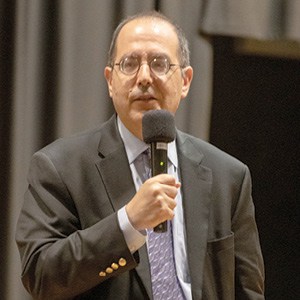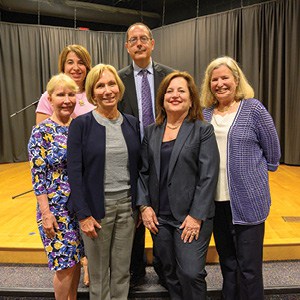Front; Laura Miller, Annie Sandler, Karen Lombart, and Jane Stein. Back: Betty Ann Levin and David Schizer.
Nearly 100 community members cycled through the Leon Family Gallery on the Reba and Sam Sandler Family Campus on April 30 to tour the exhibit, Home: Lens on Israel, with David Schizer, CEO of the American Joint Distribution Committee (JDC).
Home showcases JDC’s impact around the world through the images of various photographers—amateur and professional.
While touring the gallery, guests spent time with Schizer, who shared the unique stories behind two of the exhibit’s photographs—both taken by Annie Sandler, national JDC board member.
Following the gallery tour, guests moved into the Fleder Multi-Purpose Room for a broader conversation with Shchizer on the current state of the Jewish world, and how JDC is prepared to address emerging needs.

David Schizer.
In her introductory remarks, Annie Sandler highlighted some of the changes which have taken place during the two and a half years of Schizer’s leadership. She also pointed out that Tidewater’s Federation was “a pioneering community” in terms of its JDC funding structure, and she thanked the community for having made JDC’s work of “‘Jewish Peoplehood’ sacred and important.”
Sandler outlined the JDC mission, explaining that the organization was founded on the pillars of rescue, relief, and reconstruction of Jewish communities, and that JDC’s mission for 105 years has been a beacon call to vulnerable Jews around the globe: “If you need us, we will find you; and we will help.” Sandler described how UJFT has consistently invested in this vision through its Annual Campaign, partnering with JDC in some of their most successful initiatives—including helping revive a “dying community in Romania.” UJFT continues to invest in a thriving Jewish tomorrow by supporting programs such as Camp Szarvas, which “raises” Jewish communal leaders for today and the next generation.
When David Schizer took the stage, he echoed Sandler’s gratitude for the strong and storied partnership between UJFT and JDC. He then gave a briefing about how JDC is investing in the right strategies to support the emerging needs of Jews around the world. Schizer said that while “JDC’s mission hasn’t changed in 105 years…the world is changing.” He shared that the JDC is at its best when doing what others can’t or won’t do. He then discussed the three questions that JDC uses to measure the effectiveness of all initiatives: How important is the problem we’re targeting? How effective will our response be? Are we the right organization to do it?

David Schizer and Annie Sandler.
JDC’s recent move into Western Europe is an example. This decision was made after the three-question evaluation process. It was an operational change driven by the increase of anti-Semitism and anti-Israel terrorism there.
Schizer also highlighted JDC’s unique programmatic partnerships with Israeli municipalities. JDC invests resources in an idea or solution the government doesn’t currently address. Once identified, the program’s cost is split between JDC, the municipality, and often a third funder.
Finally, Schizer fielded questions, addressing concerns about the difficulties faced by Venezuelan Jews and what JDC is doing to ensure that safety, food, and preparations for extrication are in place. Schizer was also asked about the ongoing work in Arab countries to ensure the safety and welfare of the few elderly Jews still living there. He closed with a detailed response when asked about the looming loss of Reparations Funding in Eastern Europe (right now approximately $120 million a year from the German government to cover the needs of a dwindling community of Holocaust survivors). In preparation for this loss of critical funding, JDC has already begun streamlining operations to reduce expenses and taken necessary steps to continue whittling away at this concern.
Schizer closed with another thank you to the Tidewater Jewish community.
Sallie Williams

